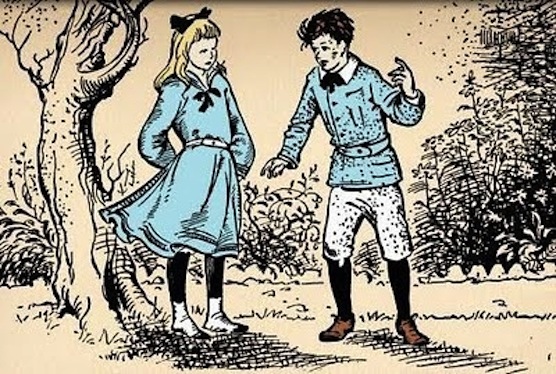Guest Post by E. J., INTJ
Chronicles of Narnia, C.S. Lewis

Dominant Ni: Digory’s curiosity is one of the defining traits of his life. He spends a lot of time gathering information, which he uses to systematically understand the world around him. These tendencies lead to his eventual career as a scholar. Digory’s attention to large-scale patterns enables him to quickly figure out what the Wood Between the Worlds is and how the rings work, despite the fact that Uncle Andrew’s instructions were incorrect. He also is the one who guesses, correctly, that burying his leftover toffee in Narnia will cause a toffee tree to grow. Digory cannot be easily distracted from his goals: when he wants to know something badly (or—in Charn—to see what will happen if he does something) he is relentless until he learns the answer. Sometimes Digory’s intense goal-focus can create problems, however. In his haste to explore other worlds, he forgets to mark the entrance to his own. If Polly had not intervened in time, they might have been permanently lost. And because of his intense desire to experiment with the bell, he failed to consider that he might not like the results.
Auxiliary Te: Digory is very direct, even when meeting Aslan for the first time. He does not waste time with social pleasantries: instead, he asks whether Aslan can give him anything to cure his mother. He is also relatively forthright with Jadis, only beginning to guard his tongue around her once she has demonstrated her evil intentions. Digory seems comfortable voicing his thought processes, frequently explaining his reasoning to Polly. His Ni curiosity is aimed more at practical questions, rather than abstract ideas. As he reasons with Peter and Susan before their first Narnian adventure, he points out the available real-world explanations for Lucy’s problem, rather than inventing more complicated possibilities. He has developed enough social awareness by this point to know that he cannot tell them about his own experience in Narnia. Instead, he points out the empirical weaknesses in their reasoning.
Tertiary Fi: Digory accepts the moral system that his parents taught him because he considers it objectively right. Others’ opinions on appropriate behavior have little effect on him unless they agree with his beliefs. Positively, this trait protects him against the warped moral influences of Uncle Andrew and Jadis. Negatively, he ignores Polly when she warns him against striking the bell in Charn. Digory normally keeps his feelings fairly private. During his mother’s nearly fatal illness—an emotional event for anyone—Digory never seeks emotional comfort from Polly. He thinks about his mother constantly, but he usually mentions her in relation to practical actions he needs to take. Although Polly knows Digory’s feelings to some extent, only Aslan recognizes their real intensity. Digory generally dislikes people who meddle in others’ affairs. As an adult, he disagrees with Peter and Susan’s attempts to psychoanalyze Lucy, believing that their interference can only make Lucy’s situation worse.
Inferior Se: Part of Digory’s frustration with moving to London is a result of it being his first prolonged exposure to an urban environment. At home he had a large area to roam outside (or to explore on his pony). In London he is mostly confined to the house and back garden. Digory enjoys visiting new places—they satisfy his Ni curiosity as well as his Se thirst for physical experience. As an adult, he chooses a career that prioritizes mental over physical exploration, but he retains his love for nature.

“Logic! Why don’t they teach logic at these schools?”
“We might try minding our own business.”
Yeah, I think I see an INTJ here.
LikeLike
Interesting… Digory, Eustace (in Silver Chair), and some of the other main characters have blurred together in my mind, so I was a little surprised at this typing (plus you don’t see many INTJ kids in children’s’ fiction). After reading the analysis, though, I couldn’t see him as any other type. I’m starting to see a TJ pattern in Lewis’s characters.
I love your Narnia typings, E.J. They’re very well-thought-out and organized.
LikeLiked by 1 person
Nice job! I’ve always liked Digory very much, although when I was a kid I sometimes found him a little too blunt (INTJ vs. INFJ).
(I hope you do Polly too :-) )
LikeLiked by 1 person
I submitted a typing post for Polly shortly after the one for Digory. Polly’s a pretty interesting compliment for him–again falling into Lewis’s TJ typing tendencies.
LikeLike
Nice. I look forward to reading it!
LikeLike